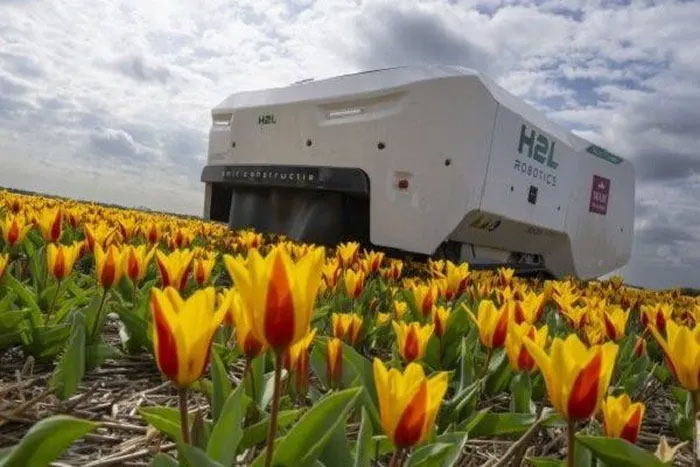AI robot helps detect diseased tulips
Visiting fields to look for sick flowers is extremely hard work for farmers. But Theo worked every day of the week and at night without ever 'complaining'.
On a windy spring morning, the robot moves along rows of yellow and red flowers, inspecting each plant and treating diseased cases to prevent the virus from spreading. Viruses slow down the growth and development of plants, leading to small and weak flowers. They also weaken the bulbs so they cannot bloom.

The robot moves at a speed of 1km/h looking for red stripes that form on leaves in case of infection.
To prevent the epidemic, 45 robots are deployed across the Netherlands as the weather warms and flower farmers approach peak season. One of the farmers using this technological weapon is Allan Visser.
'With the money to buy the robot (185,000 euros) , you can buy a very nice sports car, but I chose the robot because the car cannot help me remove diseased tulips. The equipment is indeed quite expensive, but the number of people who can see diseases on flowers is becoming less and less ,' Mr. Nisser shared.
Much slower than a sports car, Theo moves at 1km/h looking for red stripes that form on leaves in case of infection. Mr Nisser explains: 'This is precision agriculture. The robot has a camera on the front that takes thousands of photos and then identifies diseased tulips using an AI model. The device learns to recognize and then proceeds to process.
Physicist Erik de Jong working for H2L Robotics (a robot manufacturing company) said that the AI in charge of identifying diseased tulips also has GPS coordinates to help accurately locate which flowers need to be treated. He added: 'The knowledge we put into the AI model plays the 'heart' of the robot. Knowledge comes from tulip farmers '.
- Legend and meaning of Tulip flowers
- Techniques for growing tulips in the home
- Firefighters on board warships
- The field of magical tulips
- Bacteria help put drugs into diseased cells
- Sensor manufacturing helps detect nanoparticles in the air
- Japan develops robot to detect bad breath, foot odor
- Beard rescue robot
- Crab-shaped Crabster robot helps explore wrecks
- Switzerland successfully developed the eel robot to detect domestic pollution
- Robot sniffing
- Robo-Mate robot frame helps lift 10 kg objects like 1 kg
 The world's first sexless AI voice
The world's first sexless AI voice This cool t-shirt will make you invisible to AI
This cool t-shirt will make you invisible to AI AI can predict personality only through selfie photos
AI can predict personality only through selfie photos The world-famous chess player lost to Golaxy before, artificial intelligence 'made in China'
The world-famous chess player lost to Golaxy before, artificial intelligence 'made in China' Giant $2.75 million Japanese robot can transform and has a cockpit inside its body
Giant $2.75 million Japanese robot can transform and has a cockpit inside its body  Teaching a Robot to Blink Could Get the World's Attention
Teaching a Robot to Blink Could Get the World's Attention  Amphibious Spherical Robot Helps Chinese Police Patrol
Amphibious Spherical Robot Helps Chinese Police Patrol  South Korean public service robot plunges down stairs 'commits suicide'
South Korean public service robot plunges down stairs 'commits suicide'  Elon Musk shows off humanoid robot's hill climbing ability
Elon Musk shows off humanoid robot's hill climbing ability  Humanoid Robots Work in a Chinese Factory
Humanoid Robots Work in a Chinese Factory 